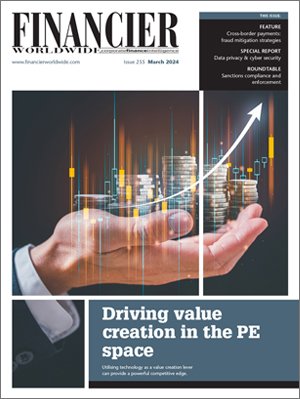US commercial Chapter 11 filings increase 72 percent in 2023
March 2024 | DEALFRONT | BANKRUPTCY & CORPORATE RESTRUCTURING
Financier Worldwide Magazine
Commercial Chapter 11 filings increased 72 percent to 6569 in 2023, up from the previous year’s total of 3819, according to data from Epiq AACER.
Overall commercial filings increased 19 percent to 25,627 up from 21,479 in 2022. Subchapter V elections within Chapter 11 also experienced a substantial increase in 2023, as the 1939 filings represented a 45 percent increase from the 1334 recorded in 2022.
2023 saw a number of significant Chapter 11 filings, including WeWork, Rite Aid, Bed, Bath & Beyond, Party City and SmileDirectClub, among others. The number of filings and the high-profile nature of many of the companies which entered bankruptcy protection have highlighted the precarious nature of the global economy in recent years. As the US economy emerged out of the coronavirus (COVID-19) pandemic, companies have had to contend with myriad problems arising from high costs, supply shortages and growing competition.
Healthcare companies also fared badly during 2023. More than 80 healthcare organisations with more than $10m in liabilities filed for bankruptcy protection last year, according to BankruptcyData. Repeat bankruptcy filings were a key feature of 2023’s restructuring activity. According to BankruptcyData, at least 19 businesses with more than $10m in debt filed for Chapter 11 for at least a second time in 2023. Last year saw the most so-called ‘Chapter 22’ filings since 2020.
Total US bankruptcy filings – including commercial and personal insolvencies – in 2023 increased 18 percent to 445,186, up from 378,390 registered during 2022. While representing a substantial year-over-year increase, total bankruptcy filings remain lower than the pre-pandemic total of 757,816 recorded in 2019.
“Though still below pre-pandemic figures, bankruptcies in all filing categories climbed last year amid the evaporation of pandemic emergency responses, increased interest rates and tougher lending standards,” said Amy Quackenboss, executive director at the American Bankruptcy Institute. “As interest rates remain elevated, increasing geopolitical tensions weigh on global supply chains and debt loads continue to grow, struggling businesses and families can turn to the proven process of bankruptcy for a financial fresh start.”
Consumer filings for 2023 were 419,559, an 18 percent increase from the 356,911 recorded during 2022. The 175,964 consumer Chapter 13 bankruptcy filings during 2023 also registered an 18 percent increase over 2022’s total of 149,069. Consumer Chapter 7 filings increased 17 percent in 2023 to 242,936 from 207,188 filings the previous year.
“As anticipated, we saw new filings in 2023 increase momentum over 2022 with a significant number of commercial filers leading the expected increase and normalization back to pre-pandemic bankruptcy volumes,” said Michael Hunter, vice president of Epiq AACER. “We expect the increase in number of consumer and commercial filers seeking bankruptcy protection to continue in 2024 given the runoff of pandemic stimulus, increased cost of funds, higher interest rates, rising delinquency rates, and near historic levels of household debt.”
Total bankruptcy filings were 34,447 in December 2023, a 16 percent increase from the December 2022 total of 29,654. The consumer bankruptcy filing total of 32,390 also represented a 16 percent increase from 27,917 in December 2022. Overall commercial filings increased 18 percent in December 2023, with 2057 up from 1737 in December 2022. The 503 commercial Chapter 11 filings in December represented a 54 percent increase from 326 in the same month the previous year. Subchapter V elections within Chapter 11 experienced a 77 percent increase, from 114 in December 2022 to 202 in December 2023.
While prognostication is always a challenge, the number of bankruptcy filings in 2024 is likely to remain in line with recent years as economic challenges persist.
© Financier Worldwide
BY
Richard Summerfield

